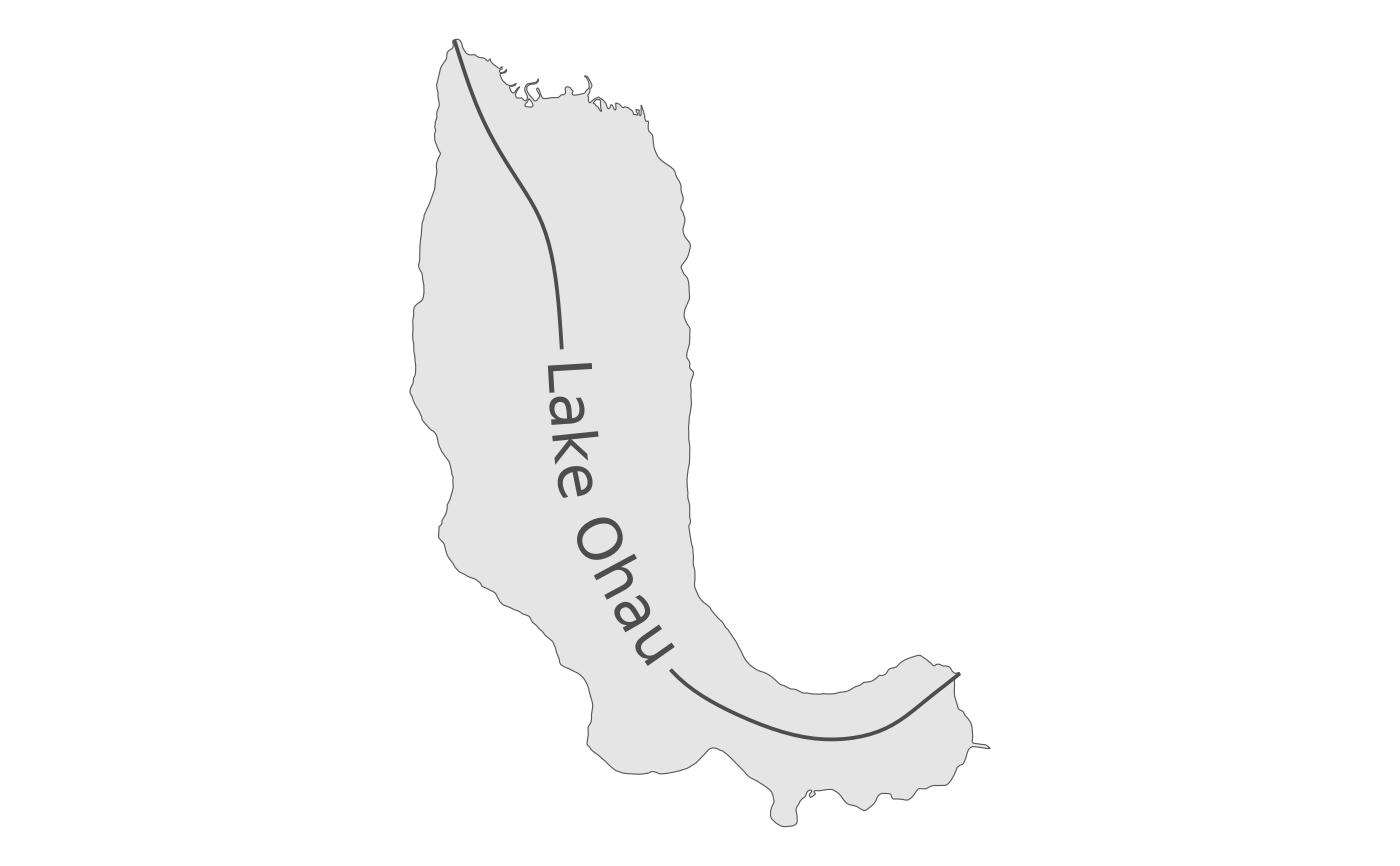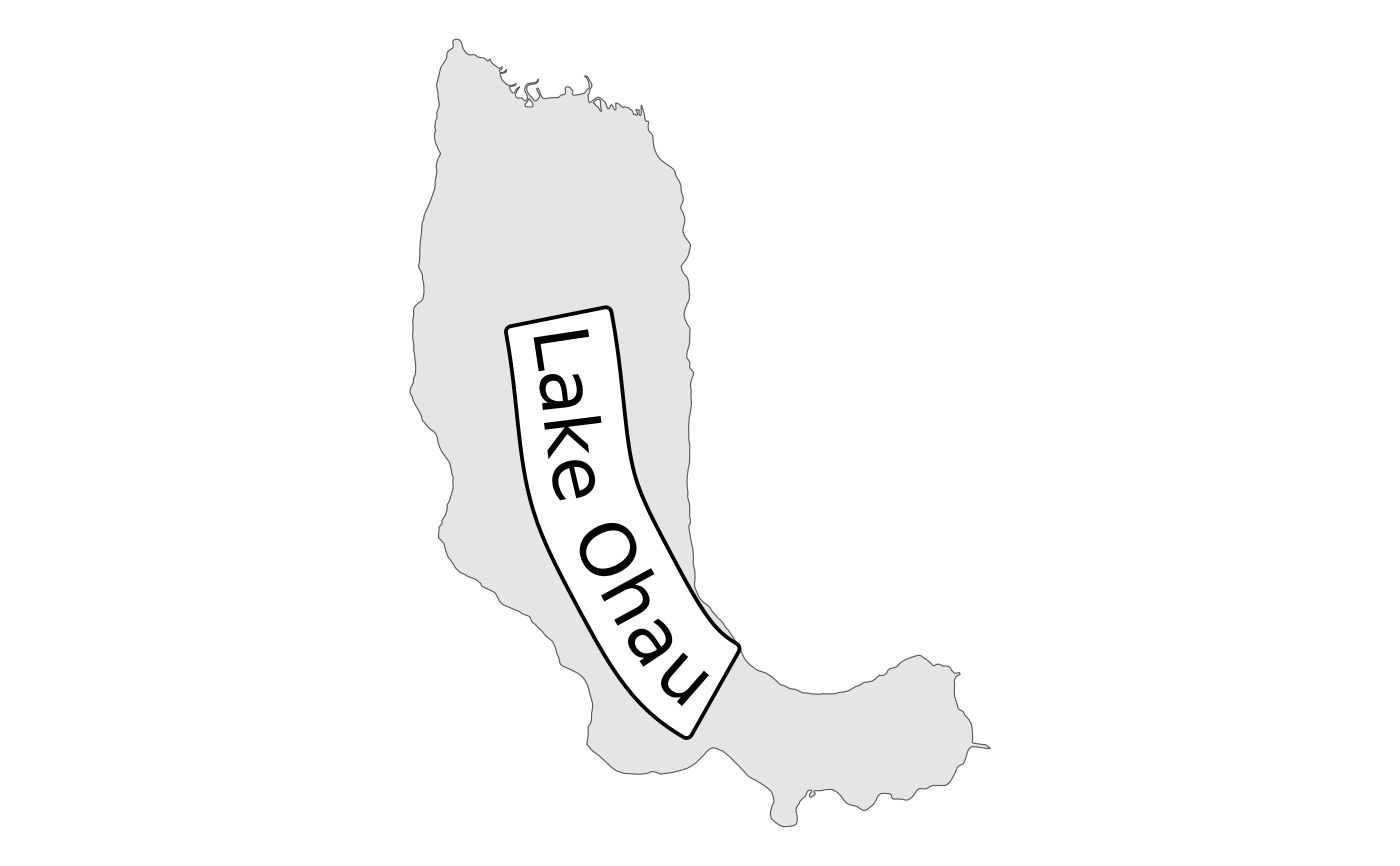Binding for geomtextpath::geom_textsf() and
geomtextpath::geom_labelsf()
Usage
geom_cnt_text(
mapping = ggplot2::aes(),
data = NULL,
stat = "sf",
position = "identity",
na.rm = FALSE,
show.legend = NA,
inherit.aes = TRUE,
keep = 0.5,
method = c("voronoi", "straight"),
simplify = TRUE,
...
)
geom_cnt_label(
mapping = ggplot2::aes(),
data = NULL,
stat = "sf",
position = "identity",
na.rm = FALSE,
show.legend = NA,
inherit.aes = TRUE,
keep = 0.5,
method = c("voronoi", "straight"),
simplify = TRUE,
...
)Arguments
- mapping
Set of aesthetic mappings created by
aes(). If specified andinherit.aes = TRUE(the default), it is combined with the default mapping at the top level of the plot. You must supplymappingif there is no plot mapping.- data
The data to be displayed in this layer. There are three options:
If
NULL, the default, the data is inherited from the plot data as specified in the call toggplot().A
data.frame, or other object, will override the plot data. All objects will be fortified to produce a data frame. Seefortify()for which variables will be created.A
functionwill be called with a single argument, the plot data. The return value must be adata.frame, and will be used as the layer data. Afunctioncan be created from aformula(e.g.~ head(.x, 10)).- stat
The statistical transformation to use on the data for this layer, either as a
ggprotoGeomsubclass or as a string naming the stat stripped of thestat_prefix (e.g."count"rather than"stat_count")- position
Position adjustment, either as a string naming the adjustment (e.g.
"jitter"to useposition_jitter), or the result of a call to a position adjustment function. Use the latter if you need to change the settings of the adjustment.- na.rm
If
FALSE, the default, missing values are removed with a warning. IfTRUE, missing values are silently removed.- show.legend
logical. Should this layer be included in the legends?
NA, the default, includes if any aesthetics are mapped.FALSEnever includes, andTRUEalways includes.You can also set this to one of "polygon", "line", and "point" to override the default legend.
- inherit.aes
If
FALSE, overrides the default aesthetics, rather than combining with them. This is most useful for helper functions that define both data and aesthetics and shouldn't inherit behaviour from the default plot specification, e.g.borders().- keep
numeric, proportion of points to retain (0.05-5.0; default 0.5). See Details.
- method
character, either
"voronoi"(default) or"straight", or just the first letter"v"or"s". See Details.- simplify
logical, if
TRUE(default) then the centerline will be smoothed withsmoothr::smooth_ksmooth()- ...
Arguments passed on to
geom_textpath,geom_labelpathtext_onlyA
logical(1)indicating whether the path part should be plotted along with the text (FALSE, the default). IfTRUE, any parameters or aesthetics relating to the drawing of the path will be ignored.gapA
logical(1)which ifTRUE, breaks the path into two sections with a gap on either side of the label. IfFALSE, the path is plotted as a whole. Alternatively, ifNA, the path will be broken if the string has avjustbetween 0 and 1, and not otherwise. The default for the label variant isFALSEand for the text variant isNA.uprightA
logical(1)which ifTRUE(default), inverts any text where the majority of letters would upside down along the path, to improve legibility. IfFALSE, the path decides the orientation of text.halignA
character(1)describing how multi-line text should be justified. Can either be"center"(default),"left"or"right".offsetA
unitobject of length 1 to determine the offset of the text from the path. If this isNULL(default), thevjustparameter decides the offset. If notNULL, theoffsetargument overrules thevjustsetting.parseA
logical(1)which ifTRUE, will coerce the labels into expressions, allowing for plotmath syntax to be used.straightA
logical(1)which ifTRUE, keeps the letters of a label on a straight baseline and ifFALSE(default), lets individual letters follow the curve. This might be helpful for noisy paths.paddingA
unitobject of length 1 to determine the padding between the text and the path when thegapparameter trims the path.text_smoothinga
numeric(1)value between 0 and 100 that smooths the text without affecting the line portion of the geom. The default value of0means no smoothing is applied.richA
logical(1)whether to interpret the text as html/markdown formatted rich text. Default:FALSE. See also the rich text section of the details ingeom_textpath().label.paddingAmount of padding around label. Defaults to 0.25 lines.
label.rRadius of rounded corners. Defaults to 0.15 lines.
Details
Aesthetics
geom_cnt_text() understands the following aesthetics:
xylabelalphaanglecolourfamilyfontfacegrouphjustlinecolourlineheightlinetypelinewidthsizespacingtextcolourvjust
In addition to aforementioned aesthetics, geom_cnt_label() also
understands:
boxcolourboxlinetypeboxlinewidthfill
Examples
# \donttest{
library(sf)
library(ggplot2)
lake <-
sf::st_read(
system.file("extdata/example.gpkg", package = "centerline"),
layer = "lake",
quiet = TRUE
)
# Plot centerline and lake name as text
ggplot() +
geom_sf(data = lake) +
geom_cnt_text(
data = lake,
aes(label = "Lake Ohau"),
size = 8,
simplify = TRUE
) +
theme_void()
 # Plot lake name as label
ggplot() +
geom_sf(data = lake) +
geom_cnt_label(
data = lake,
aes(label = "Lake Ohau"),
linecolor = NA, # disable line drawing
size = 10,
method = "s",
simplify = TRUE
) +
theme_void()
# Plot lake name as label
ggplot() +
geom_sf(data = lake) +
geom_cnt_label(
data = lake,
aes(label = "Lake Ohau"),
linecolor = NA, # disable line drawing
size = 10,
method = "s",
simplify = TRUE
) +
theme_void()
 # }
# }